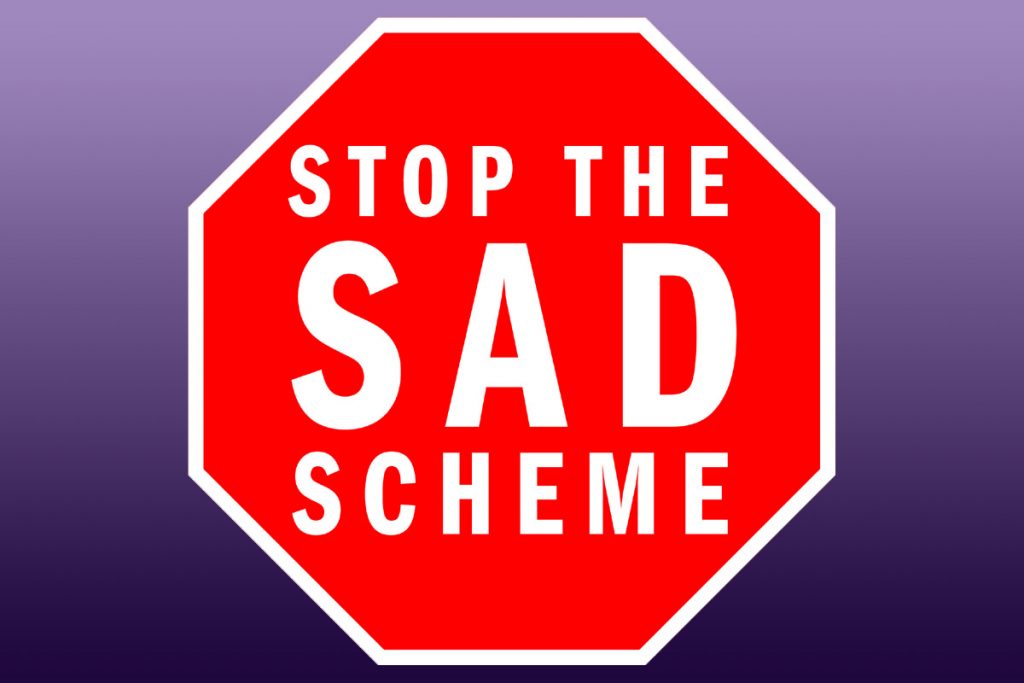District of New Jersey Adopts SAD Scheme Standing Order
[A reminder that I am collecting SAD Scheme standing orders. If you have seen one, can you please email it to me even if you think I might have seen it before? TIA.]
 In re: “Schedule A” Cases Standing Order 2025-04 (D.N.J. Sept. 25, 2025). Prof. Fackrell’s thread on the order.
In re: “Schedule A” Cases Standing Order 2025-04 (D.N.J. Sept. 25, 2025). Prof. Fackrell’s thread on the order.
The district of New Jersey adopted a Standing Order regarding the SAD Scheme. To date, I believe only individual judges have adopted SAD Scheme standing orders, so a district-wide policy may be novel.
For the most part, the standing order copies verbatim, or at least substantially, much of Judge Ranjan’s standing order. Though Judge Ranjan is in a different district (W.D. Pa.), both courts are located in jurisdictions governed by the Third Circuit Court of Appeals, so borrowing from each other might reflect that kinship.
The D.N.J. standing order self-justifies: “Schedule A litigants are gradually, and often unusually, modifying the Court’s rules and procedures, creating extraordinary exceptions.” While this is similar in spirit to Judge Ranjan’s order, the court introduces some new rhetoric, calling SAD Scheme litigation “unusual” and “extraordinary.” After thousands of SAD Scheme cases have implicitly normalized some of the scheme’s egregious tactics, it’s good to see the court go back to first principles.
Except as noted, the rest of the quotes to the D.N.J. order are identical to or virtually the same as the language in Judge Ranjan’s order.
Joinder. The standing order only permits “a single defendant or group of defendants acting under the same operator” on a single complaint and for a single filing fee but is “open to consolidating related cases once it is satisfied that personal jurisdiction exists and the other consolidation factors are met (e.g., that there is a logical relationship among the parties and the claims).”
Jurisdiction. The D.N.J. standing order says that “personal jurisdiction may turn out to be a major issue throughout the litigation of Schedule A cases involving foreign defendants.” The D.N.J. standing order cracks down on standard SAD Scheme allegations of personal jurisdiction:
To satisfy Rule 11, the complaint must plausibly plead allegations of personal jurisdiction, including contacts with the forum if specific jurisdiction is invoked. The law is well-settled that simply being an online seller on Amazon isn’t enough. And the law is also well-settled that that plaintiff cannot create personal jurisdiction by ordering a product to be shipped to the forum. So before the filing of the complaint, the plaintiff must have developed some evidence of each defendant’s contacts with the forums, including, if necessary, sales information or distribution locations
Thus, “personal jurisdiction will be a defendant-specific inquiry, which examines the particular defendant’s sales of the allegedly infringing product into the forum state.” The standing order says that jurisdictional discovery will be permitted only after the complaint clears its Rule 11 threshold.
Service of Process. The standing order restricts alternative service of process, such as email:
The Court will not, as a matter of course, allow a plaintiff to dispense with ordinary service requirements, including foreign service requirements under the Hague Convention. There needs to be a particularized showing—which will likely be case specific and defendant specific—before alternate service is authorized. Any motions for alternate service should explain what efforts have been made to discover each defendant’s domicile and to effectuate service by usual means (including what efforts were undertaken to determine the address of each defendant and the validity of the address) and whether the form of alternate service requested is permitted by the Hague Convention given each defendant’s domicile (and the factual basis for this)
Ex Parte Proceedings
The Court does not intend, as a matter of course, to grant ex parte TRO motions. Because “[p]reliminary injunctive relief is an extraordinary remedy and should be granted only in limited circumstances[,]” the Court will not grant TRO and preliminary-injunction motions based on conclusory statements. The Court will not grant any TRO motions where there is not a sound basis that personal jurisdiction exists as to the defendant. The Court is also unlikely to grant any TRO motion to freeze online accounts absent some evidence that the defendant has transferred or is transferring assets to avoid judgment in the specific case, and also after a specific showing linking the amount of assets to the amount of disgorgement at issue.
Sealing
“Because the ex parte TRO motion is usually the justification for granting a motion to seal, the Court is unlikely to seal any filings.”
Anti-Judge Shopping
A filing of the complaint must be accompanied by a declaration from plaintiff’s counsel that identifies any pending cases brought by the plaintiff(s) against any of the named defendants prior to this suit. The declaration must identify the case number(s), note whether the intellectual property at issue was the same as in this case, and describe the status and/or disposition of the other case(s) (e.g., pending, settlement, dismissal, or other disposition)
Implications
Like Judge Ranjan’s order, the overriding theme of this standing order: in general, mass-allegations against defendants don’t cut it. Each defendant’s facts need to be developed and presented. This is not new, except that the SAD Scheme twisted the inquiry and somehow persuaded judges to ignore the long-standing requirements of particularized allegations. But without mass-allegations, the rightsowners lose much of their economies of scale and can’t make their vibe-based arguments that the defendants are part of nefarious Chinese plots to overthrow our social order (not that the US needs any external help with that).
This standing order is a district-wide crackdown on the SAD Scheme, and it reaches further than any one judge could. (There are roughly two dozen judges in D.N.J.). As with Judge Ranjan’s order, there’s no way for plaintiffs to successfully bring a SAD Scheme case pursuant to these rules. The rightsowners can still sue, but if the complaint requires individualized showings per defendant and there’s no ex parte hearing, then I wouldn’t classify the suit as a SAD Scheme. Given the entire district has shut its doors to the SAD Scheme, how can the rightsowners’ bar challenge the standing order? Will they?
I doubt the rightsowner’s bar cares too much about any district other than N.D. Ill. After all, nearly 90% of the SAD Scheme cases are still taking place in Chicago. But I have to imagine the bar doesn’t love seeing an entire district shut its doors to their practices. If other districts do the same, eventually the practice will be meaningfully blocked. That’s why I think the bar eventually will have to challenge a court’s ability to issue a standing order with respect to the SAD Scheme. At the same time, the bar knows that critics like myself are eagerly awaiting a chance to get these cases in front of appellate judges so we can get some precedential wins. Bring it on.
* * *
Omnibus Order Regarding Schedule “A” Causes of Action
At least three S.D. Fla. judges have adopted standing orders titled “Omnibus Order Regarding Schedule “A” Causes of Action”: Judges Altonoga, Brown, and Ruiz. I haven’t taken the time yet to check how their orders differ from each other. For this post, I’ll focus just on Judge Ruiz’s standing order as entered in the Crimpit Group case on April 8, 2025.
Jurisdiction. “Any motion for entry of temporary restraining order or for entry of preliminary injunction must include detailed steps Plaintiff has taken to verify that this Court has personal jurisdiction over EACH Defendant.”
Ex Parte TRO. Each request must “establish entitlement to relief with regard to EACH Defendant.”
Service of Process. “A motion for alternate service will not be granted where a plaintiff does not provide evidence or affidavits to show what efforts Plaintiff has undertaken to determine whether the addresses it has on file for EACH Defendant are actually associated with EACH Defendant.” The order enumerates specific details required for an alternative service of process.
Judge-Shopping. Plaintiff’s counsel must conduct “a search of case filings in the records of the Clerk of the United States District Court for all districts to ascertain whether Defendants have ever been sued prior to the filing of this suit for any alleged violations of Plaintiff’s intellectual property rights…[If so], counsel shall include in the verified response information about the present status of that litigation, if it is pending, and, if not pending, the nature of the disposition (e.g., settlement, dismissal, or other disposition).”
Overall, this standing order raises the bar on plaintiffs, which is why a Boies Schiller attorney engaged in judge-shopping to get around it. Still, these standards are weak compared to the Judge Ranjan/DNJ standing orders. I wonder if the S.D. Fla. judges will progressively tighten up their standards in response to the moves by other courts?
#StopTheSADScheme
Prior Blog Posts on the SAD Scheme
- Court “Sanctions” SAD Scheme Judge Shopping—Crimpit v. Schedule A Defendants
- Chicago-Kent SAD Scheme Symposium TOMORROW
- Amicus Brief Urges Seventh Circuit to Award Attorneys’ Fees in SAD Scheme Case–Louis Poulsen v. Lightzey
- Court Rejects Schedule A Claims Against Sellers of Compatible Parts/Accessories (Cross-Post)
- Judge Kness: the SAD Scheme “Should No Longer Be Perpetuated in Its Present Form”–Eicher Motors v. Schedule A Defendants
- SAD Scheme Lawyers Sanctioned for Judge-Shopping–Dongguan Deego v. Schedule A
- Judge Ranjan Cracks Down on SAD Scheme Cases
- Because the SAD Scheme Disregards Due Process, Errors Inevitably Ensue–Modlily v. Funlingo
- SAD Scheme-Style Case Falls Apart When the Defendant Appears in Court—King Spider v. Pandabuy
- Serial Copyright Plaintiff Lacks Standing to Enforce Third-Party Copyrights–Viral DRM v 7News
- Another N.D. Ill. Judge Balks at SAD Scheme Joinder–Zaful v. Schedule A Defendants
- Judge Rejects SAD Scheme Joinder–Toyota v. Schedule A Defendants
- Another Judge Balks at SAD Scheme Joinder–Xie v. Annex A
- Will Judges Become More Skeptical of Joinder in SAD Scheme Cases?–Dongguan Juyuan v. Schedule A
- SAD Scheme Leads to Another Massively Disproportionate Asset Freeze–Powell v. Schedule A
- Misjoinder Dooms SAD Scheme Patent Case–Wang v. Schedule A Defendants
- Judge Hammers SEC for Lying to Get an Ex Parte TRO–SEC v. Digital Licensing
- Judge Reconsiders SAD Scheme Ruling Against Online Marketplaces–Squishmallows v. Alibaba
- N.D. Cal. Judge Pushes Back on Copyright SAD Scheme Cases–Viral DRM v. YouTube Schedule A Defendants
- A Judge Enumerates a SAD Scheme Plaintiff’s Multiple Abuses, But Still Won’t Award Sanctions–Jiangsu Huari Webbing Leather v. Schedule A Defendants
- Why Online Marketplaces Don’t Do More to Combat the SAD Scheme–Squishmallows v. Alibaba
- SAD Scheme Cases Are Always Troubling–Betty’s Best v. Schedule A Defendants
- Judge Pushes Back on SAD Scheme Sealing Requests
- Roblox Sanctioned for SAD Scheme Abuse–Roblox v. Schedule A Defendants
- Now Available: the Published Version of My SAD Scheme Article
- In a SAD Scheme Case, Court Rejects Injunction Over “Emoji” Trademark
- Schedule A (SAD Scheme) Plaintiff Sanctioned for “Fraud on the Court”–Xped v. Respect the Look
- My Comments to the USPTO About the SAD Scheme and Anticounterfeiting/Antipiracy Efforts
- My New Article on Abusive “Schedule A” IP Lawsuits Will Likely Leave You Angry
- If the Word “Emoji” is a Protectable Trademark, What Happens Next?–Emoji GmbH v. Schedule A Defendants
- My Declaration Identifying Emoji Co. GmbH as a Possible Trademark Troll


